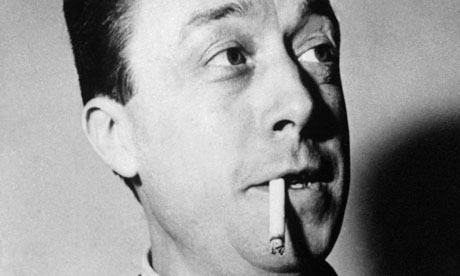
Early on this month, @BaroqueLibraria contacted me on Twitter to ask about The Immoralist. "I'm about halfway through and I find the main character's self-absorption annoying," s/he said. "Are we supposed to like him?"
That's a question that can't really be answered in 140 characters. Certainly, my response – "Not necessarily" – didn't impress BaroqueLibraria, who wrote: "OK then. I guess … I thought that it was a treatise to be more like him."
In a way, that's true. As Michel tells his story to his friends, he constantly justifies himself and extols the virtues of his position. I was tempted to write that it's a "plea for understanding", but that isn't quite right. Michel doesn't beg so much as expect that the logic of his arguments will win through. He has chosen the path of strength, of health and of self-truth. He does only – as his almost-mentor Melanque puts it – what is "natural". And if acting according to his nature means abandoning society, that only shows, as Melanque again explains, that society and the people "who don't want to be like themselves" suffer from "moral agoraphobia … the worst kind of cowardice".
At face value, The Immoralist might easily be read as a justification for the abandonment of all standard morals, an invitation to think in ways most of us will find abhorrent. As Reading Group contributor Adamastor wrote, "Michel isn't homosexual: he's a paedophile. The question is, given that he is wealthy and powerful because of his wealth, why shouldn't he use his wealth and power to do what he wants, regardless of other people's concept of morality?"
These aren't easy ideas. Perhaps BaroqueLibraria was right to worry. Except, there is an entirely different way of looking at things. As meltingman put it:
"This book … is about freedom; how societies' norms and laws crush freedom and our natural desires, but it also gives the feeling that absolute freedom leads to worse – ie, excercising your 'freedom' to bugger young boys means that these young boys have no freedom or purpose other than to sate your selfishness."
Proust (an aptly named contributor, if ever there was one), added:
"This is THE classic example of the unreliable narrator – Gide uses the 'ironic monologue' technique in the sense that the reader becomes aware of the fact that the narrator Michel is lying to himself as he attempts to justify his behaviour and is (tragically) 'blind' to the implications of his sexuality. Brilliantly constructed, even down to the tripartite structure of individual sentences (also three central characters beginning with the letter 'M', for example), Gide demonstrates the dangers of a lack of self-awareness. Michel is a latent homosexual who is unable to confront his responsibility for the chain of events, as he seeks to exonerate himself via the account he is giving to his friends who are 'judging' his narrative. Although based on aspects of Gide's own life (eg, his unconsummated marriage, the life-changing trips to north Africa, the encounter with Wilde – Menalque in the novel, the sexual awakening), Michel comes to represent the dangers of excessive individualism."
The book is called The Immoralist, after all. In both English and French the title invites us to judge Michel and to do so harshly. He is not even amoral. He is bad. Let's not forget either that his actions have all but destroyed him. The story opens with his friend, the first narrator, explaining that he and two companions have had to go to rescue Michel, who has sent out a "cry for help". His philosophy has brought him to financial ruin, caused the death of his blameless wife, and left him humiliated in a distant land, remaining only because he wants to hang out with an underage garcon.
Which brings us to a third possible reading. Marcel is neither the Nietzschean übermensch, nor the man who demonstrates the flaws in such thinking. He is, more simply, a very naughty boy. As @everythingsperfect wrote:
"I can't quite take Michel seriously. To me he just seems to be an incredibly stupid young man, with the extreme self-obsession of the young. I have known young men like that. I hope he grows out of it. And I really wanted to like André Gide, he sounds like a fascinating character. But I find that The Immoralist is uncomfortably close to John Crace's take on it … "
Which is to say, Michel is a hopeless solipsist. All he really shows is how daft young men can be. It's certainly an interesting take on the book. Although it does raise the question of where that leaves Camus, Sartre, Huysmans and all the others who have learned from his example.







